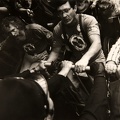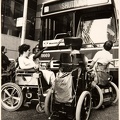Public transit officials lament riders defecting to suburbia
By Walt Gibbs
Of the Examiner Staff
9/27/87
More than 15,000 mass-transit officials from around North America have descended on Moscone Center to debate how bus and train agencies can survive in the age of suburbanization — the age of the auto.
"Ridership is now at the level it was in the mid-1960s and half of what it was at the end of World War II," Robert Kiley, head of a national committee studying the future of transit, told members of the American Public Transit Association Monday.
He also said transit systems are running further in the red than they did in the past. In 1965, he said, the average passenger fare covered all but 2 cents of the actual cost of a ride; in 1987, the fare is 90 cents short of paying for the ride, and subsidies make up the deficit.
"We're at a critical point in our industry's history," said Kiley, chairman of the Metropolitan Transportation Authority of New York.
The reason is demographic change, he said. People used to live in the suburbs and work downtown, Kiley said. But as traditional industry wanes and the service economy booms, job centers are springing up in low-density suburbs served poorly by mass transit. Some major corporations in San Francisco, including Bank of America and Pacific Bell, have moved offices to the East Bay and Marin County.
Golden Gate Transit, AC Transit and BART are all grappling with ridership declines attributed partly to such changing commute patterns.
But these and other Bay Area agencies this week have shined up their buses and train cars and laid aside their local problems to serve as hosts.
A prototype of BART's new "C" cars, which will help double the system's capacity, was on display. So was a model car of San Jose's new light-rail system, dubbed SCAT for Santa Clara County Area Transit. Glistening buses representing almost every Bay Area agency streamed past the entrance to the convention hall, where 425 exhibitors from 15 countries showed off the latest in transit technology.
"The people of the Bay Area can be justifiably proud," said APTA Chairwoman Reba Malone of San Antonio, admiring everything from the cable cars to BART.
Municipal Railway General Manager Bill Stead introduced a nine-minute film, paid for by Bay Area transit agencies, that he said made the regional bus and train network "look like Disneyland."
In fact, he said, the 7,000-mile system is a "world-class work horse" serving 1.6 million passengers a day. Only New York and Chicago exceed the Bay Area in the percentage of commuters who use mass transit, he said.
In the streets outside the convention, meanwhile, hundreds of disabled demonstrators continued protests demanding full access to the nation's transit facilities.
A group called the September Alliance for Accessible Transit has been conducting civil disobedience protests since Sunday by blocking buses or the paths of convention goers. On Tuesday, about 25 demonstrators, mostly in wheelchairs, blocked the cable car line on Powell Street near Market.
The transit line was left idle for about 40 minutes as a noontime crowd watched protesters block the cable car's path or get off their wheelchairs and lie on the cable Car turnaround.
As of 1 p.m., at least 15 people had been arrested.
Fifty-six protesters were arrested Sunday and Monday, mostly on charges of deliberately blocking sidewalks or streets.
Demonstrators staged a noisy protest Sunday night in front of City Hall that ended with the arrest of 22 people, 16 of them in wheelchairs, for obstructing traffic. One protester, who was not in a wheelchair, was charged with knocking a police officer to the pavement. The first arrests Monday came after demonstrators, many in wheelchairs, blocked an entrance to Moscone Center where shuttle buses deposited delegates to the transit group's convention.
Picture by United Press International displays Disabled protesters block shuttle bus carrying delegates to S.F. public-transit convention.
Police charged 25 demonstrators with obstructing traffic and released them.
Protest organizer Marilyn Golden said, "Great headway in public transit access for the handicapped has been made in a number of cities, but there is no coordinated national program. That's what we are seeking. If this convention adopts a national policy, we will go away quietly."
Officials of the transit group have said they feel the access question should be handled on a local level.
John D. O'Connor of The Examiner staff contributed to this report.
- Created on
- Thursday 11 July 2013
- Posted on
- Thursday 3 August 2017
- Tags
- APTA - American Public Transit Association, blocking shuttle buses, blocking streets, cable car turnaround, cable cars, future of transit, Marilyn Golden, Moscone Center, Powell St, protests, Reba Malone, San Francisco City Hall
- Albums
- Visits
- 991
- Rating score
- no rate
- Rate this photo


0 comments